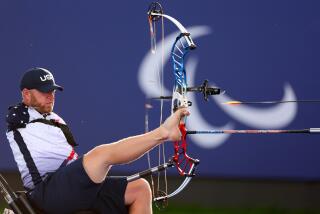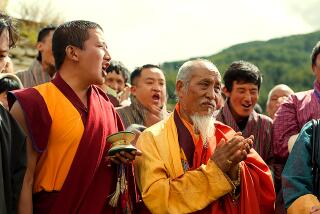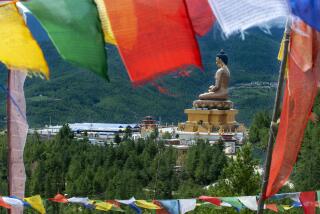Archers Aim for Gold in Tiny Bhutan
- Share via
THIMPHU, Bhutan — Like a young superstar, Jubzang needs only one name to be recognized in the village streets of the Himalayan kingdom of Bhutan.
He’s never won a medal, but he has represented his homeland at the Olympics in Barcelona, Spain; Atlanta and Sydney, Australia--competing in archery, the national sport.
Bhutanese stream onto riverbanks and into parks on weekends and after work in the evening for friendly archery matches. They use wooden stringed bows, with hastily carved arrows, or modern double-bowed steel weapons.
Some boys get involved in the sport in school, like Jubzang, 30, who started shooting with bamboo bows at 11. Most take it up in their 20s.
Joining the national team of five men and five women is like having a job.
Archer Tshering Chhoden, 21, Bhutan’s only other Olympic athlete, arrives at 6:30 a.m. for weight training and jogging at the ornately painted Bhutan Olympic Training Center on a hillside of pink and white rhododendrons. She puts in an eight-hour day and earns a subsidy that helps her family of eight get by.
“I wanted to shoot when I was young. But before, girls were not allowed, were not given the chance,” Chhoden says.
She had to compete in round after round to make the team. Finally, she was selected, along with Jubzang, for Bhutan’s two-person team at the Sydney Olympics last year.
“At that time, I had broken my [personal] record and I was very happy,” Chhoden says. Getting knocked out in the early rounds of the Olympics made her “quite upset,” but she adds: “Someday our team will win.”
“It’s practice, practice,” she says. “We have to think we can do it.”
Small countries like Bhutan get their teams into the Olympics and other tournaments under quota systems that allow them to enter only one sport. The Bhutan Olympic Committee also wants to field a taekwondo team and is pushing for changes to help small countries compete.
Bhutan “has been a bit isolated due to their own concept of preserving their culture and tradition,” says Pere Miro, the International Olympic Committee’s head of relations with national Olympic committees. “Bhutan’s sports did not progress during this isolation from world sports.”
The IOC is considering ways to help, including coaching and training facilities, he says.
Archery contests are part of every Bhutanese festival. Inter-village rivalries take place year-round. Astrologers choose the teams and cast spells on the opposition. Alcohol is an integral part of the tournaments. Dancing and catcalls between shots increase as the day progresses.
Jubzang seldom participates in those events because the sport practiced at parks and festivals is quite different from Olympic competition.
Groups of men team up and take turns shooting 130 yards to a small, painted wooden target before a backdrop of mud and hay. Dogs lie in the field between the targets. There is a lot of laughing and shouting.
The Olympic target is larger, and closer to the shooter at 76.5 yards for women and 98.4 for men.
Still, Chhoden has to work harder than most Bhutanese men because her Olympic bow has no pulley system like Bhutanese bows that hold the string back during aiming. She must pull it back with just her arm and strains to hold steady while aiming.
“For us, the more you pull, the harder it becomes, like a bamboo pole,” Chhoden says. “You must be very strong if you want to be a good archer.”
More to Read
Go beyond the scoreboard
Get the latest on L.A.'s teams in the daily Sports Report newsletter.
You may occasionally receive promotional content from the Los Angeles Times.






